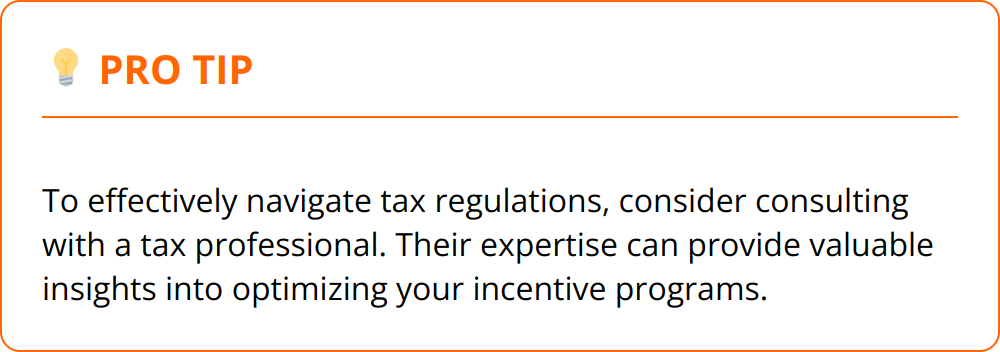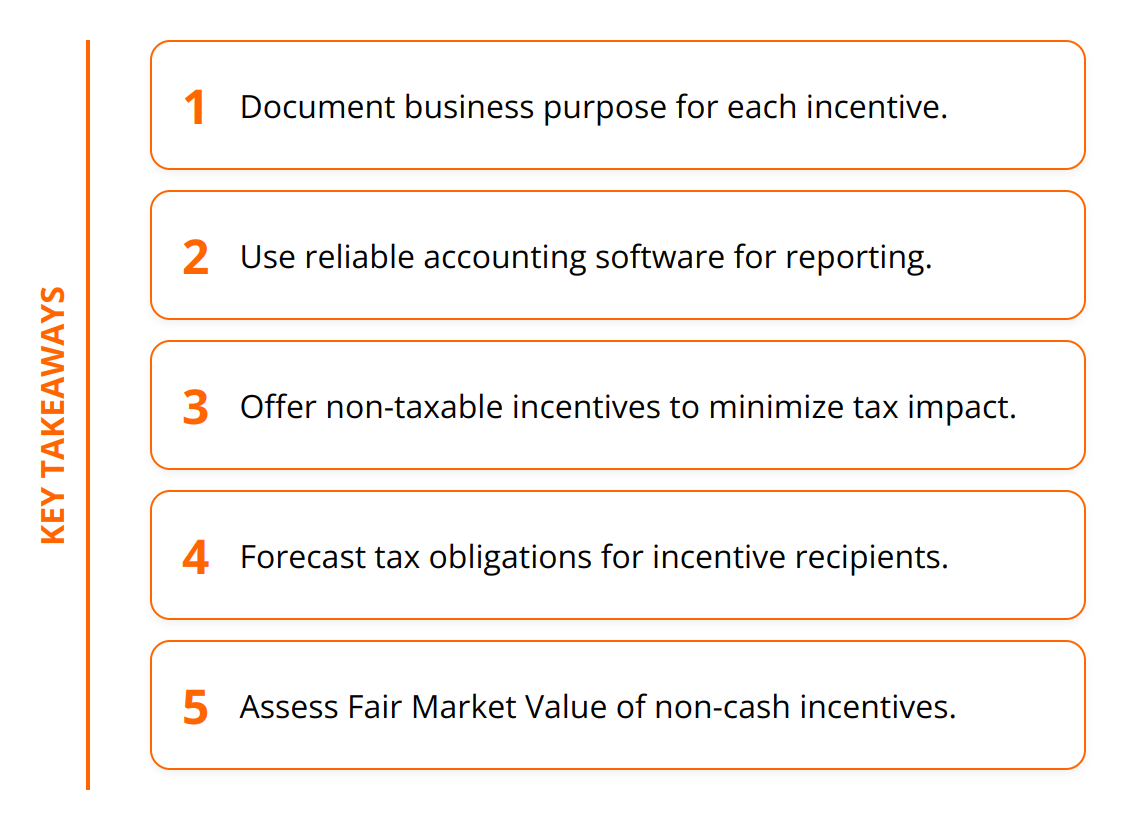
Navigating the maze of tax implications for incentive programs can seem daunting at first. We at Reward the World understand the complexity and want to help simplify it. Whether for businesses or individuals, knowing the tax implications is essential. Our guide aims to shed light on the essentials you need to be aware of.
Tax Implications for Incentive Programs
When structuring incentive programs, it’s essential to grasp the tax implications that could affect both your business and its beneficiaries. Not only does this knowledge safeguard against unforeseen tax liabilities, but it also optimizes the value of the incentives for the recipient. Below, we delve into the critical elements that every organization should consider.
Types of Incentives and Their Tax Implications
Incentive programs can be broadly categorized into two: monetary and non-monetary incentives. Monetary incentives, including cash bonuses and gift cards, are straightforward in their tax handling. They are generally treated as additional income to the recipient and subject to both income and payroll taxes. Non-monetary incentives, such as merchandise, travel rewards, or services, have a less direct tax path. Their fair market value must be included in the recipient’s income and is taxable. Understanding the value and tax implications of each incentive type is fundamental for compliance and effective program design.
Taxable vs. Non-Taxable Incentives
Taxable incentives are the norm. They encompass everything from performance bonuses to holiday gifts over minimal value thresholds. However, certain non-cash employee achievement awards can qualify as non-taxable under specific conditions, such as longevity or safety awards, provided they are part of a meaningful presentation and not cash or cash-equivalent items. The distinction between taxable and non-taxable incentives highlights the importance of careful incentive program planning to maximize benefits while minimizing tax burdens.
Key Terminology
- Fair Market Value (FMV): The price an incentive would sell for on the open market. Understanding FMV is vital for accurately reporting the value of non-monetary incentives.
- Taxable Income: Any income that’s subject to income tax, including most forms of bonuses and incentives.
- Form W-2 and 1099-NEC: Documents for reporting income. Form W-2 is used for employees, while Form 1099-NEC reports payments to independent contractors, including non-employee compensation that exceeds $600.
Navigating the tax implications of incentive programs effectively requires a balance between rewarding employees or customers and adhering to tax laws. Missteps can lead to penalties, while well-structured programs can enhance motivation without unnecessary tax complications. For practical insights on structuring your incentive programs, our guides on incentive program compliance and integrating digital solutions offer actionable advice.

By focusing on the taxability of different incentives and understanding the associated terminologies, businesses can create more effective and compliant incentive programs that serve to motivate and reward without unintended tax consequences.
Tax Strategies for Businesses
Incentive programs are not only tools for motivation but also carry significant tax considerations for businesses. Strategic planning is paramount to navigating these waters smoothly. Below we explore practical steps to optimize tax deductions, adhere to reporting requirements, and minimize tax liabilities effectively.
Optimize Tax Deductions
Businesses can often deduct the cost of incentive programs as business expenses. This includes both monetary rewards and the fair market value of non-monetary incentives. However, the key is ensuring these incentives are directly related to business activities or employee performance. To maximize deductions:
- Document the business purpose for each incentive, linking it directly to business goals or employee performance criteria.
- Stay updated on IRS regulations regarding deductible expenses. Certain types of incentives, especially lavish or extravagant rewards, may not qualify for deductions.
- Consider integrating digital solutions into your incentive programs for more efficient tracking and reporting. Digital platforms can simplify the process of documenting incentive-related expenses and their business purposes.
Reporting Requirements and Compliance
Accurate reporting is fundamental. Failing to report incentive rewards correctly can result in penalties. Businesses must issue Form W-2 for employees and Form 1099-NEC for independent contractors if the total value of incentives exceeds $600 in a year. To ensure compliance:
- Use reliable accounting software that can automate the reporting process, reducing the risk of errors.
- Educate your HR and accounting teams about the latest tax regulations related to incentives.
- Regular audits of your incentive programs can help identify any discrepancies or areas of non-compliance before they become issues.

Minimize Tax Liabilities
Smart planning can help minimize the tax impact of incentive programs on both the business and its recipients. Strategies include:
- Offering non-taxable incentives, such as certain employee achievement awards, which are not subject to income tax up to a specific limit.
- Utilizing non-cash incentives wisely, because they can offer more value to the recipient for a lower tax burden compared to cash rewards. Remember, the fair market value of these incentives must still be reported.
- Structuring incentive programs in a way that spreads out the recognition over time, which can help manage the tax impact for recipients.
For additional insights on optimizing your incentive programs, explore our guide on integrating digital solutions.
By understanding the tax implications associated with incentive programs and implementing the strategies outlined above, businesses can navigate the complexities of tax compliance while maximizing the value and effectiveness of their rewards.
Navigating Incentive Taxation
The landscape of incentive program taxation holds vast implications for employees and participants. For both cash and non-cash incentives, understanding the taxation process and preparing accordingly can save headaches and financial strain down the line.
Taxation on Incentives
When it comes to taxation, all incentives, be they cash or non-cash, generally count as taxable income. For employees, this means bonuses, gift cards, and even trips add to their annual taxable earnings. The value of non-cash incentives, such as merchandise or travel awards, needs to be reported as Fair Market Value (FMV), which becomes part of the employee’s income and thus, taxable.
One key strategy to mitigate the tax hit for recipients is to choose awards wisely. Non-cash incentives can sometimes offer a higher perceived value without correspondingly high tax implications, compared to straight cash bonuses. But both the giver and the receiver should be aware of the FMV and report it appropriately.
Reporting Incentive Earnings
For the reporting of incentives, accuracy is paramount. Employees should expect to see additional earnings reflected in their Form W-2, while independent contractors must report through Form 1099-NEC any amount over $600. Misreporting or underreporting income can attract penalties from the IRS.
Businesses play a crucial role in this process. It’s essential for a company to issue accurate tax documents reflecting all incentives given. Reliable accounting software can automate much of this process, making life easier for HR departments and ensuring compliance with tax laws.
Planning for Tax Implications
Both businesses and their employees or participants can take steps to manage the potential tax implications of incentive programs. Here are practical tips to consider:
- Forecast Tax Obligations: Employees should estimate the additional tax owed due to incentives and plan accordingly. Setting aside a portion of cash awards or saving to cover the taxes on non-cash incentives can prevent year-end surprises.
- Understand the Value: Always assess the FMV of non-cash incentives. This understanding can help both businesses and employees weigh the true value and cost of these awards.
- Seek Professional Advice: Tax professionals can offer guidance tailored to individual situations, helping navigate the complexities of incentive taxation.

For businesses, integrating systems that track and report incentive awards efficiently can be a game-changer. Digital solutions not only streamline administrative processes but also ensure accuracy and compliance. For more insights, our guide on automating reward mechanisms provides actionable advice.
By taking a proactive approach to understanding and managing incentive program taxation, both companies and their beneficiaries can make the most of these rewards. Preparing and planning for the tax implications ensures that incentives remain a positive force, motivating and rewarding individuals without creating undue tax burdens.
Final Thoughts
In unraveling the complexities of incentive program tax implications, it’s clear that both monetary and non-monetary rewards play pivotal roles in business strategies. These incentives are powerful tools for motivating teams and fostering customer loyalty but come with their tax nuances. Understanding the taxable nature of most incentives, the fair market value (FMV) principle, accurate reporting requirements, and strategic tax minimization tactics are essential takeaways.

The importance of consulting with tax professionals cannot be overstressed. Their expertise is invaluable in navigating the ever-evolving tax landscape, ensuring compliance, and optimizing incentive strategies for tax efficiency. This approach not only safeguards against penalties but also enhances the overall effectiveness of incentive programs.
Businesses looking to use incentive programs wisely should aim for a delicate balance between motivation and financial prudence. Emphasizing non-taxable and non-cash rewards, when possible, can maximize the perceived value for recipients while minimizing tax liabilities. In addition, leveraging seamless technological solutions for management and reporting can streamline processes, ensuring accuracy and compliance with less effort.
We at Reward the World pride ourselves on offering a comprehensive incentives platform that simplifies these complexities. Our solution is designed to cater to diverse needs, ensuring your incentive programs are both motivating and compliant. Explore our insights on integrating digital solutions and discover how our platform can elevate your rewards strategy.
Remember, when implemented correctly and compliantly, incentive programs can significantly enhance engagement, boost performance, and elevate customer loyalty. Let Reward the World help you achieve these goals with our award-winning platform, making your rewards strategy a success story.
